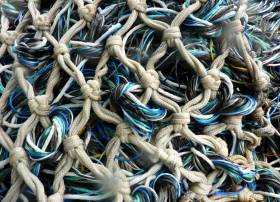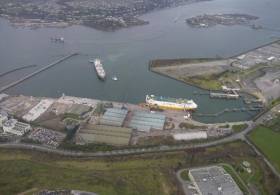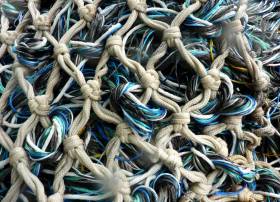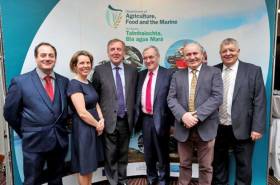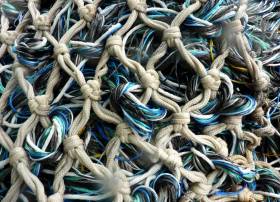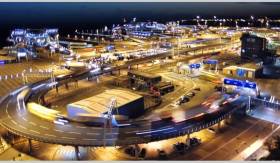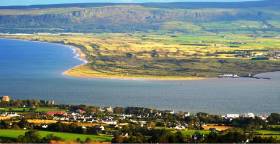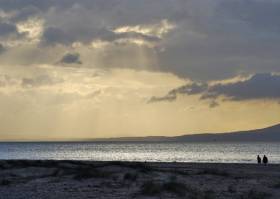Displaying items by tag: Brexit
#Brexit - Marine Minister Michael Creed will take his St Patrick's Day duties as an opportunity to extend his engagement with key EU member states on Brexit over the coming days.
Following recent formal meetings with his Spanish, Estonian and Maltese counterparts, Minister Creed scheduled meetings with his colleagues from Germany, Netherlands and Denmark to discuss common concerns about the likely impact of Brexit on the agri-food and fisheries sectors.
Speaking yesterday (Wednesday 15 March) ahead of a bilateral with German Agriculture Minister Christian Schmidt, Minister Creed said he intends to “emphasise the very real and serious concerns that we in Ireland have about the potential impact of Brexit on our agri-food and fisheries sectors, and to explore other member states’ assessment of the implications from their perspective.”
Noting that Brexit poses the threat of “a very negative impact on trade”, the minister highlighted in particular the many common concerns in the fisheries area.
“We are confronted with potentially very grave challenges on fisheries, primarily in relation to continued access to UK waters, where much of our fishing effort is undertaken,” he said. “I hope to discuss them in some detail, with a view to building a common platform as we seek to protect the interests of our fishing industries and communities.”
#BypassUK - The Port of Cork has ramped up talks with continental ferry companies writes Independent.ie about providing more direct freight routes between Ireland and mainland Europe due to Brexit, its chairman has said.
John Mullins said fresh food exporters in particular cannot afford the time to ship their produce to Europe via Britain if border restrictions are going to be imposed.
"If you're a mussel producer in west Cork and you need to get to the Paris market on Monday, and you're harvesting on a Friday, you cannot afford the time with fresh mussels, waiting in Holyhead, and then waiting again in Dover as you go over the landbridge," Mr Mullins said, at a recent Brexit event at UCD.
"It's not going to work. Most recently we've been speaking to continental ferry providers about actually having more direct ferry routes into continental Europe out of Cork, and out of Rosslare," he said. "You will see a reorientation of logistics."
Mr Mullins later told the Irish Independent that one of the options the port has long been looking at is trying to get direct access to Spain.
Such proposed direct services Afloat has reported on in recent years, follow this link. For more on the story from the Independent click here.
Majority of Exporters Use UK for Transhipment of Goods Overseas
#ExportBrexit - Two thirds of Irish exporters go through Britain a survey suggests writes The Independent to get their produce to customers on mainland Europe and further afield.
And 40pc said that using a longer, yet more direct, route would adversely affect the quality of the product.
But 30pc of exporters quizzed for the survey by the Irish Exporters Association (IEA) have taken no action to assess the fallout from the Brexit vote, even though 70pc said a weakening sterling had impacted their business.
Marie Armstrong, IEA vice-president, said the number of exporters relying on the UK as a land bridge to the continent was "hugely significant".
"And those members are very concerned about continuing to use the UK in terms of customs, and being stopped at borders," Ms Armstrong told TDs yesterday.
For more on the survey's findings click here.
Irish & Spanish Fisheries Ministers Discuss ‘Common Concerns’ Over Brexit in Brussels
#Fishing - Marine Minister Michael Creed’s meeting with his Spanish counterpart in Brussels yesterday (Monday 6 March) was “a very useful opportunity to identify common concerns” regarding the impact of Brexit on Europe’s fisheries.
Commenting on his discussion with Spain’s Isabel García Tejerina at the latest Council of Agriculture and Fisheries Ministers, Minister Creed said: “We agreed that we will work towards building a common platform involving the main member states operating within the UK 200-mile fishery limits.
“The EU fishing industry is taking a similar approach, and our combined efforts will strengthen our delivery of the EU fishing priorities in the Brexit negotiations.”
Minister Creed had bilateral meetings on both the fisheries and agri-food aspects of Brexit with his counterparts from Scotland and Estonia, among others, as well as with Commissioner Phil Hogan.
2017 Maritime Commerce Forum Heads for Dublin Docklands
#Forum - The 2017 Maritime Commerce Forum will take place as a lunch-time event held in Dublin on Thursday 9th March. The time for the forum is from 12.30pm – 2.30pm and will be held at The Marker Hotel, Grand Canal Square. The venue is located in the capital's 'Docklands' quarter.
The event will follow on from a series of meetings held last year to discuss opportunities for Ireland in the area of ship leasing, maritime finance and maritime taxation. Given important developments, such as Brexit, which have occurred since the last meeting, the Forum looks forward to bringing this group together to discuss key opportunities for Ireland in light of a changing global environment. To launch the Forum this year and as a guest speaker is Mr. Alan Dukes, Chairman, Asia Matters.
Alan Dukes is the Chairman and co-founder of Asia Matters. He was a member of the Dáil (lower House of the Irish Parliament) for twenty-one years and during his political career served as the Irish Minister for Agriculture, Finance, Justice and Transport and Energy and Communications.
Alan was Leader of the Fine Gael Party for three years and was Chairman of the Irish Parliament’s Foreign Affairs Committee. He is a former Governor of the International Monetary Fund and a former Governor of the World Bank.
In his work at Asia Matters, he is strongly committed to the importance of two way benefits in Asia Ireland bilateral trade relations.
To reserve a place at the event from the Irish Maritime Development Office, RSVP to [email protected] by this Thursday 2nd March.
Marine Minister Notes ‘Serious Threats’ From Brexit At Dialogue For Seafood Sector
#Brexit - Marine Minister Michael Creed yesterday (Wednesday 1 February) hosted a sectoral dialogue focused on the seafood sector and the potential impacts it could face from Brexit.
Opening the dialogue, Minister Creed highlighted the importance of ensuring that the Irish seafood sector is protected during Brexit negotiations.
“The key challenge for this Government,” he said, “will be to ensure that fisheries concerns and those of the wider seafood sector are high on the EU agenda and that our sector is not separated from the overall negotiations on a new EU/UK relationship.”
Minister Creed went on to say that for the Irish seafood sector, Brexit “poses a very particular set of serious threats over and above the trade implications common to most sectors.
“That is not to underplay the importance of a good trade outcome for the seafood sector but rather to emphasise the reality that this sector faces challenges that are unique.”
The minister explained that those threats were potential loss of access to fishing grounds in the UK zone and possible attempts by the UK to increase its current quota share at the expense of Ireland and others.
He added that “any changes to existing rights for the Irish and EU catching sector must be resisted strenuously.”
Speaking following the event, which took place in the Radisson Blu Hotel at Dublin Airport, Minister Creed commended the high turnout from the Irish seafood sector.
“Today’s turnout and active engagement by stakeholders from across the sector demonstrates the desire of all to pull together in the effort to protect Irish interests as we enter Brexit negotiations.
“I want to thank all concerned for their very positive contribution to what was a very engaging afternoon, and to assure them once again that their concerns and ideas will be taken on board.”
The sectoral dialogue saw a number of presentations by key sector stakeholders, followed by detailed discussions covering access rights, management of shared stocks, trade and aquaculture issues.
“Today was another important step in the ongoing journey we have all been engaged in since the June referendum in the UK. namely understanding and preparing for all of the possible implications arising from Brexit,” said Minister Creed.
“We still don’t know what exactly the UK will seek but the deeper our understanding of the issues, the better prepared we all will be for the challenges ahead.”
As previously reported on Afloat.ie, concern is spreading across Ireland’s fishing industry over the impact of Brexit on Irish fishing grounds and international seafood markets.
Irish Fishing Industry Wants Clarity Over Brexit
#Brexit - Concern is spreading across Ireland’s fishing industry over the impact of Brexit on Irish fishing grounds and markets, as The Irish Times reports.
The potential impact of fishing vessels from elsewhere in the EU that might be expelled from British waters would put significant pressure on Ireland’s marine resource, the industry fears.
But there are also worries over the status of a post-Brexit Britain as a key market for Irish seafood, not to mention the concentration of quotas for certain species in specific regions – such as mackerel in the North West.
The Irish Times has much more on the story HERE.
#DoverRecord – Record freight for Belfast Harbour user Stena Line on routes to Scotland and England for the year 2016 has also been achieved by other ferry operators based in the Port of Dover, writes Jehan Ashmore.
Dover, Europe’s busiest ferry port (served by operators, P&O and DFDS), experienced another healthy year in traffic volumes. The port is served by a total of 11 ferries on two short-sea routes linking to France at Calais and Dunkerque, which combined handled 2.6 million freight vehicles in 2016. Freight volumes in just the last four years have increased by 32%.
Commenting on the Port of Dover figures, Tim Waggott, Chief Executive of the Port said, "As we continue to handle more UK trade, the Port welcomes the prime minister's statement on the Government’s headline negotiating position for Brexit. Greater certainty of the broad parameters is a positive step forward"
He added: "Any changes brought forward to the country's trading relationship need to be mindful of the UK's absolute need to maintain the rapid transit of goods and passengers through Dover and our sister ports on the European mainland.
"The Port and the CBI remain clear that a barrier-free relationship with the EU - our largest, closest and most important trading partner - must be a critical outcome of the negotiations to ensure we make a success of Brexit."
On the vitally important trading shipping lanes of the Strait of Dover, was this morning the asphalt/bitumen tanker Iver Ability. As previously reported on Afloat, the long-stay Dublin Bay anchorage caller since last summer had on Saturday finally departed.
The tanker experienced a ‘reaction’ during transport of bitumen in Dublin Port in August and is currently heading further into the North Sea. The 2006 built vessel is bound for the Dutch port of Delfzijl.
A Brexit Thought – Who Owns Lough Foyle?
The Secretary of State for Northern Ireland had a lot more than maritime matters on his mind this past week…. So he probably wasn’t giving a lot of thought to Lough Foyle as the Northern Assembly collapsed.
Neither, I suggest, was the British Prime Minister, Theresa May, when she announced how the UK will perform its Brexit from the EU.
I don’t think our Taoiseach, Enda Kenny, was either and probably not our Minister for Foreign Affairs, Charlie Flanagan.
But, they should give Lough Foyle a lot of thought…
James Brokenshire claims that the whole of Lough Foyle is within the UK…. And as Secretary for Northern Ireland that’s an important claim…..
The Irish Department of Foreign Affairs says that Ireland does not accept that claim.
The Northern Ireland Office, under UK administrative control, cites a 1662 Charter of Charles the Second which included “the waters and bed, as well as the fisheries” of the Lough as part of County Londonderry….
Derry, of course, if you see it with Irish Nationalistic eyes…..
Lough Foyle is the estuary of the River Foyle separating Northern Ireland from the Republic, but the British claim to the entire Lough could take its rights up to the shores of the Republic and what will that do for such as the fisheries, for example, when the UK intends to take control of those back from the EU during its Brexit….
The Good Friday Agreement created the Loughs Agency as a cross-Border body for the Foyle.. so where does it stand in the context of Brexit?
Just though I’d mention it in the context, of course, of the past week…
Brexit Revives Dispute Over Lough Foyle Territory Rights
#Brexit - Brexit has revived a dormant territorial dispute between Britain and the Republic of Ireland over the ownership of Lough Foyle, as the Belfast Telegraph reports.
Leinster House has rejected a claim by Northern Ireland Secretary James Brokenshire that the UK includes the whole of the estuary between Counties Donegal and Derry, which has been under the auspices of the cross-border Loughs Agency since the Good Friday Agreement.
Lough Foyle and Carlingford Lough, between Counties Louth and Down, are both matters of dispute between Dublin and London which have only intensified with the uncertainly over fishing rights as the UK prepares to leave the EU and the Common Fisheries Policy.
The Belfast Telegraph has more on the story HERE.


























